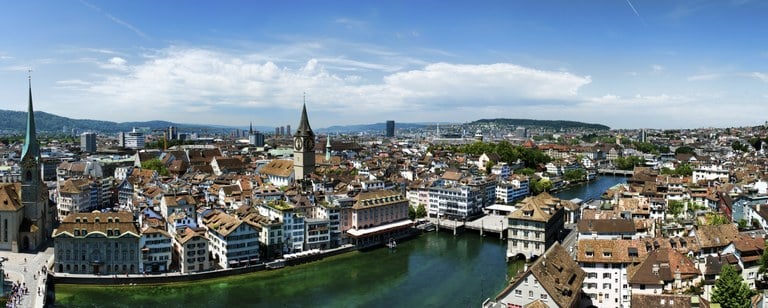A Meeting With Swiss Billionaires in Zürich
| filed under: Zürich, Learn German, Schweizerdeutsch, Switzerland, Schweiz, Speaking German, Rosetta Stone, Rosetta Stone Blog, Deutsch lernen, Altstadt Zürich, Deutsch sprechen, Learning German, Swiss German, lerne DeutschIt was a rare time—my business partner, Mark, and I were in Berlin, and we had scored a meeting with the Zurich-based investment company that had funded two of our clients.
As you may know, the primary languages in Switzerland are German and French, though Italian and an ancient Latin language called Romansch are official languages as well. Well, in Zürich, the Swiss speak German, and very formal German at that.
Mark and I scheduled our flight to Zürich half a day early, so we wandered around the old city until our meeting at two in the afternoon. We gave ourselves so much time—enough for a tour of the city and lunch, a full morning of it—because punctuality is demanded in Germanic countries. Tardiness is a strong sign of disrespect and a missed appointment can be curtains. And, if you’re later than ten minutes, you’d better call and have a brilliant excuse.
While the Swiss do speak German, it is Swiss German (Schweizerdeutsch). It’s often pretty unintelligible to speakers of Standard German—to the point that Swiss-German speakers on TV or in movies are regularly subtitled if shown in Germany. In Zürich, it didn’t seem to be too bad, though. One thing I needed to remember is that the Swiss, even when speaking Standard German, have a somewhat different vocabulary than that used in Germany. For example, a formal hello in Switzerland is Grüezi, replacing Guten Morgen, Guten Tag, and Guten Abend in German. If you’re greeting a group, you can use Grüezi mitenand.
Mark prepped me before we arrived, noting that Swiss business meetings are formal and I should greet everyone with a quick, firm handshake (no fish hands or mad fist pumps) while looking them in the eye. Also important while doing business in Switzerland is to respect rank, hierarchy, and title. Mark is Herr Harrison; all other colleagues are referred to likewise—Herr Schmidt and Frau Spitzer, for example. The protocol is similar to that in the US military, so if you’ve ever served in the armed forces, you’ll be well-suited to conducting business with the Swiss.
We greeted the two gentlemen, or Herren, with salutations like, “Guten Tag, Herr Schmidt. Nett Sie kennenzulernen.” In German, that’s the formal way of saying, “Good afternoon, Mr. Schmidt. It is a pleasure to meet you.”
At that point, Mark asked if perhaps the meeting might be conducted in English for me: “Herr Abraham hat gerade angefangen, Deutsch zu lernen. Würde es Ihnen passen, dieses Gespräch auf Englisch zu führen? Sonst kann ich für uns ohne Probleme dolmetschen.” In English, that means “Mr. Abraham has just begun learning German. Would it be all right with you to do this meeting in English? Alternatively, I’ll be happy to translate.”
While English may well be the lingua franca of European business, it’s disrespectful to assume that all meetings will be conducted in English. Herr Schmidt and his colleague had every right to say no to the request. As the Swiss are also highly gracious, the two men’s desire to be generous trumped their possible awkwardness negotiating in a second or third language. In the end, they both spoke very good English.
The meeting went OK, but we weren’t adequately prepared for Swiss-German billionaires! Why? In the world of Swiss and German business, one needs to come well-equipped with proposals written in German and English, illustrated and bound, and circulated along with an explicit agenda well before the meeting. And, during the meeting there should always be a presentation. Unfortunately, we didn’t prepare anything for the meeting, believing this to be a meet and greet, not a pitch. But, Swiss business is much more formal than that, and I won’t make that mistake again.
At the end of the meeting, I thanked Herr Schmidt, I shook his hand with very few pleasantries, and we left. It wasn’t so much curt as it was efficient, though I must admit that I’m used to meetings in the United States, where there’s a lot of lingering, grabbing coffee or a drink, and then maybe going back to someone’s desk for a post-meeting debrief or chat. That day in Zürich, we arrived, we greeted, we met, we parted. And then, there Mark and I were, in the early dusk of an ancient city, still hopped up on adrenaline.
What Mark told me afterward was interesting. Conducting the meeting in English, he said, has certain advantages from a relationship standpoint because English has neither hierarchy nor formality built in. That said, maybe our billionaire investors would prefer to be spoken to in a way that reflects their success and standing. We’ll never know, but this experience taught me that the more I know of the local culture and language, the better off I’ll be.

(Originally posted on the Rosetta Stone blog)

